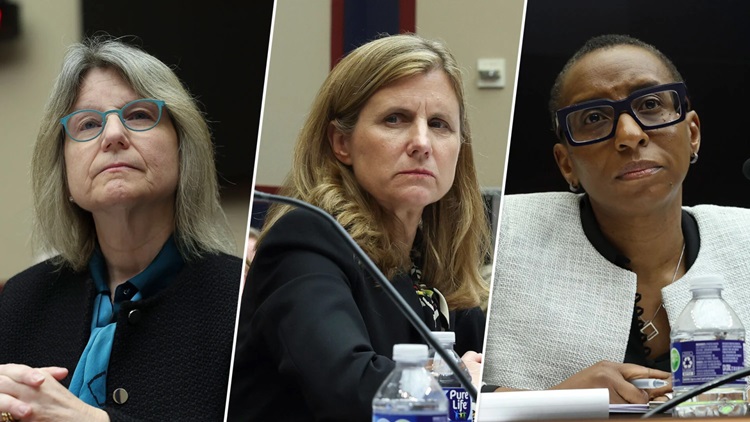By Harry Storm
Talking to Jerry Seinfeld on his excellent online show Comedians in Cars Getting Coffee, Norm MacDonald quoted another comedian, Patton Oswalt, saying that the worst thing about Bill Cosby’s sexual assaults on women he drugged was the hypocrisy. “I disagree,” says Macdonald, “I thought it was the raping.”
I was reminded of Macdonald’s joke watching the House of Representatives’ Education and Workforce Committee grill the presidents of three of the top universities in the United States – Harvard, the Massachusetts Institute of Technology (MIT) and the University of Pennsylvania – about whether they would allow calls for genocide of Jews on their campuses. When each answered that it would depend on “context,” their hypocrisy was indeed staggering. But contextualizing calls for genocide was far worse.
Admittedly, direct calls for genocide of Jews have yet to occur on these campuses. Calling for Palestine to be “free, from the river to the sea” implies the elimination and/or the annihilation of the State of Israel, the world’s only Jewish state, and is considered by many Jews and other supporters of Israel to be an implicit call for the genocide of Jewish Israelis, as is explicit support for Hamas and/or referring to the Oct. 7 massacre in southern Israel as “legitimate resistance.”
Some may interpret all of the above statements differently. But one would expect that explicit calls for genocide leave no room for “context,” even if such calls at these universities are hypothetical (at least for now).
Unfortunately, that isn’t the case. When asked if calling for the genocide of Jews would violate Harvard‘s rules on bullying and harassment, President Claudine Gay – already under fire for her lackadaisical attitude about Harvard student groups immediately blaming Israel “100%” for the massacre of its own citizens, and for the resulting flight of alumni and other donors from the university – replied that “antisemitic rhetoric” had to cross into “conduct” (“bullying, harassment, intimidation”) before it violated Harvard’s policies.
She defended these policies on the basis of freedom of speech. “We embrace a commitment to free expression, even of views that are objectionable, offensive, [or] hateful.” Calling this statement hypocritical would be like calling the sun hot. According to the Foundation for Individual Rights and Education (FIRE), a non-partisan organization that monitors freedom of expression and rates universities in terms of how much freedom of expression is allowed on their campuses, Harvard finished dead last out of 248 universities surveyed this year, and was the only university to garner a rating of “abysmal.”
Interestingly, the search committee that hired Gay was petitioned by nearly 250 Harvard affiliates one year ago to nominate a candidate who “actively affirms the importance of free speech” on campus. Clearly, Gay was not who they had in mind, particularly given her history as dean of the Faculty of Arts and Sciences, during which time she:
- Played a significant role in not allowing David Kane, a data science professor, to be rehired after he invited libertarian scholar Charles Murray (a Harvard alumnus) in 2020 to give an online lecture. First she attacked Murray’s work as lacking in academic merit. Then she announced she would investigate complaints by students that Kane had made “racist” comments at a previous posting at another university, though these complaints have been shown to be without serious foundation.
- Supported law school students (law students!) in 2019 who wanted law professor Ronald Sullivan removed as dean of the Winthrop House residence because he was on Harvey Weinstein’s defense team. When Sullivan made the obvious point that all defendants, no matter how odious, are entitled to a legal defense, Gay called his response “insufficient.” He did not retain his position as dean.
- Led what has been described as a witchhunt against economics professor Roland Fryer after he was accused of sexual harassment for some inappropriate jokes and texts. But many feel his punishment – suspended for 2 years without pay, his lab shuttered – was disproportionate and was really because of his research into race, policing and education, which countered the woke narrative on race. (Gay reportedly sought revocation of Fryer’s tenure, but in that, at least, she was unsuccessful.)
Other anti-free-speech incidents at Harvard include but aren’t limited to:
- The disinvitation by the English Department to philosopher Devin Buckley. Buckley had been invited to give a lecture of British Romanticism, but because she opposed putting men who identified as women into women’s prisons or allowing them to compete in women’s sports, she became persona non grata.
- The hounding of human evolutionary biology professor Carole Hooven out of her job for stating that medical schools should continue to teach that there are only two biological sexes. She was called a transphobe, attacked by a DEI task force, and accused of being transphobic by the chair of another Harvard department.
So much for the commitment to freedom of speech at Harvard.
The University of Pennsylvania, another Ivy League school, was just ahead of Harvard at No. 247 of the FIRE free-speech rankings. UPenn did manage to avoid being “abysmal”; it garnered a “very poor” rating and 11.13 “free speech” points (Harvard received a grand total of 0 points). When asked if calling for the genocide of Jews would violate UPenn policies, the university’s president, Elizabeth Magill, said calls for the genocide of Jews only constituted bullying and harassment if they were “directed, severe and pervasive.” In other words, it would depend on the “context.” Note: As this article was being finalized, it was announced that Magill had resigned as UPenn president.
But sanctioning other speech at UPenn didn’t depend on context. When women on the UPenn women’s team tried to speak out against having to share a locker room with Lia (formerly Will) Thomas, a biological man who identifies as a woman, they were strongly pressured not to complain, according to then team member Paula Scanlon. They were also told in no uncertain terms not to voice concerns about sharing their changing room with an intact biological man.
At a formal meeting, Scanlon says, they were told “don’t talk to the media, you will regret it.” Instead of at least acknowledging their complaints, the women were told that counseling services were available to help them come to terms with Thomas’ participation on the team and sharing changing facilities. (To add insult to injury, UPenn later nominated Thomas as its candidate for NCAA “Woman of the Year.”)
In short, UPenn didn’t concern itself with context when women swimmers tried to speak up about not wanting a biological man on their swim team or, at the very least, out of their locker room: They were told to shut up or face unspecified sanctions. But should someone call for the genocide of Jews, only the context would determine whether that person is sanctioned.
In his book Jews Don’t Count, author and comedian David Baddiel argues that progressive identity politics tends to ignore antisemitism. But at elite universities like Harvard, UPenn and MIT, it would seem Jews DO count – as the only minority for whom context and actions are required before genocidal threats are taken seriously.





